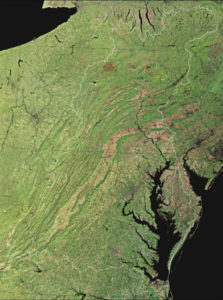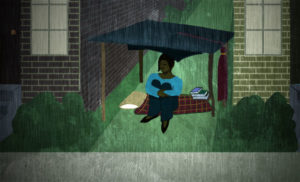Annie Snider , - The Agenda
Stephan: I grew up on the shores of the Chesapeake Bay, ate the abundant seafood that came out of its waters, sailed on its surface, and swam and scuba dived beneath its waves. Sometime in the late sixties something began to happen to the Bay, and by the 1970s it was clear this most fecund of waters was dying. Here is the story of the Bay and what is being done. It is a story on one bad decision piled atop another and, as is so often the case when other life forms are involved, it illustrates our fundamental misperception of our place in the Earth's matrix of life.

The Chesapeake Bay (bottom right) absorbs pollution from 64,000 square miles of the American northeast, a watershed stretching from New York to Virginia with 18 million people.
Credit: USGS
LANCASTER, PENNSYLVANIA — Linn Moedinger’s farm has been in his family for 10 generations, dating back to 1711, 150 acres of rich fields and meandering streams nestled in the heart of Pennsylvania Dutch country. As long as the family has owned it, it’s been a working farm; today Moedinger leases the fields to a neighbor who grows corn, wheat and soybeans. The family relies on the crop income to keep up the historic farmhouses they call home.
Nonetheless, Moedinger recently surrendered 12 acres of property along his tiny, unnamed streams to plant wide strips of oak trees, dogwood shrubs and other native plants, paid for by the government. If all goes according to plan, that land will never produce crops again.
The […]
No Comments
Stephan: Here you can see how the problems in the Chesapeake Bay evolved, and why the same process is playing out in the Great Lakes. As usual it comes down to greed, short-term thinking, and a misapprehension of our place in the matrix of life.
 It took Michigan’s conservatives years to acknowledge and address Flint’s lead-in-the-water crisis. But they sure jumped on the Plastic Bag Crisis. It’s all about priorities.
It took Michigan’s conservatives years to acknowledge and address Flint’s lead-in-the-water crisis. But they sure jumped on the Plastic Bag Crisis. It’s all about priorities.
Muskegon and Washtenaw counties have been contemplating local regulation on plastic bag waste here in Michigan. And within seconds the same folks who let Flint’s kids endure years of brain and development withering poison from lead tainted water jumped on a statewide ban on banning plastic bags in Michigan.
The same Tea Party, Government-Is-Evil folks running the State of Michigan who wanted Michigan to be run like a business….the same folks who ushered in privatized prison food companies who let employees pass weapons and phones to prisoners while feeding them maggot infested meat…gave us poisoned water in Flint. This same group of folks who abdicated their own roles as folks who Govern suddenly and magically found a new purpose when some counties decided to regulated the sale of plastic bags.
All of a sudden these lazy Michigan senators had nothing but time to slap down any Michigan community that wanted to regulate the sale of plastic bags.
I live here in Muskegon, Michigan. It’s a coastal community […]
1 Comment
PRESIDENT BARACK OBAMA, - White House
Stephan: Seventy one years ago today, the 27th May, the world changed, and to mark this transition President Obama did something that should have been done years ago. He went to Hiroshima and acknowledged what had happened and gave it context for the future. His dignity and compassionate humanity, only cursorily covered by American media, was a stark contrast to the low burlesque that is our Presidential election process. The speech is worth reading, and here it is, as are the remarks of Japanese Prime Minister Abe

President Obama lays wreath on Hiroshima Peace Memorial
Credit: CNN
HIRSOSHIMA PEACE MEMORIAL, HIROSHIMA, JAPAN — Seventy-one years ago, on a bright, cloudless morning, death fell from the sky and the world was changed. A flash of light and a wall of fire destroyed a city and demonstrated that mankind possessed the means to destroy itself.
Why do we come to this place, to Hiroshima? We come to ponder a terrible force unleashed in a not so distant past. We come to mourn the dead, including over 100,000 in Japanese men, women and children; thousands of Koreans; a dozen Americans held prisoner. Their souls speak to us. They ask us to look inward, to take stock of who we are and what we might become.
It is not the fact of war that sets Hiroshima apart. Artifacts tell us that violent conflict appeared with the very first man. Our early ancestors, having learned to make blades from flint and spears from wood, used these tools […]
1 Comment
Josh Harkinson, Staff Reporter - Mother Jones
Stephan: The health effects of mobile phones has been a subject of debate for years. Now, as this report describes, what appears to be the definitive study on the fundamental question -- Is there a health risk to using a mobile phone? -- has just been published. I think you should take this very seriously.

Credit: Robert Piras/Shutterstock
It’s the moment we’ve all been dreading. Initial findings from a massive federal study, released on Thursday, suggest that radio-frequency (RF) radiation, the type emitted by cellphones, can cause cancer.
The findings from a $25 million study, conducted over two-and-a-half years by the National Toxicology Program (NTP), showed that male rats exposed to two types of RF radiation were significantly more likely than unexposed rats to develop a type of brain cancer called a glioma, and also had a higher chance of developing the rare, malignant form of tumor known as a schwannoma of the heart.
The radiation level the rats received was “not very different” from what humans are exposed to.
The radiation level the rats received was “not very different” from what humans are exposed to when they use cell phones, said Chris Portier, former associate director of the NTP, who commissioned the study.
As the intensity of the radiation increased, so did the incidence of cancer in the rats. (The highest radiation level was five to seven times as strong as what humans typically receive while using […]
3 Comments
Eleanor J. Bader, - truthout
Stephan: Most nations in Europe have decided that educating young people at the least possible cost to them, is a social good because an educated populace is best for democracy, and educated people are more capable of pushing the technology envelope, which is an essential aspect of a profitable economy. In the United States we have taken a very different path.

Credit: Lauren Walker / Truthout
When the College Cost Reduction and Access Act took effect in 2009, neither lawmakers nor school administrators had any idea how many college students would check the box on the Free Application for Federal Student Aid (FAFSA) — the document that determines eligibility for Pell grants, subsidized loans and work-study awards that help students pay for college or vocational training — to indicate that they were homeless.
At last tabulation, the number was 58,000, a small percentage of the 20.2 million students presently enrolled in both undergraduate and graduate study. Nonetheless, school counselors and advocates believe the number is starkly inaccurate and represents a mere fraction of university students who actually lack a permanent home.
Shirley Fan-Chan, director of U-ACCESS at the University of Massachusetts Boston, provides on-campus support to students who are experiencing food insecurity and homelessness. “Most students think of homelessness as being on the street, sleeping in doorways, and for the most part, college students don’t do this,” she told Truthout. “They hide out. They may […]
No Comments


 It took Michigan’s conservatives years to acknowledge and address Flint’s lead-in-the-water crisis. But they sure jumped on the Plastic Bag Crisis. It’s all about priorities.
It took Michigan’s conservatives years to acknowledge and address Flint’s lead-in-the-water crisis. But they sure jumped on the Plastic Bag Crisis. It’s all about priorities.











